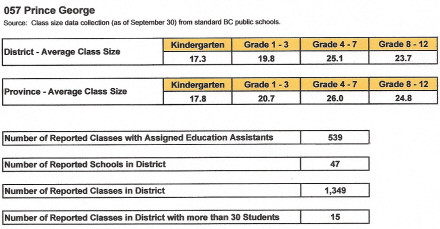Provincial Class Size Report Reflects Declining Enrolment
By 250 News

District 57 average class size compared to Provincial Averages
Prince George, B.C.- The provincial class size report for the ’09-10 school year indicates class sizes continue to be smaller today than they were before the class size and composition legislation was brought in four years ago.
When the first class size report was released in 2005-06,there were 9,253 classes with more than 30 students. Today, that number has decreased by more than 65 per cent to 3,229.
In some cases, classes accommodate extra students for instructional or program purposes, or students who receive additional support. In other cases, classes may exceed 30 students because they involve subjects that can benefit from a large number of students participating, such as drama, band, physical education or fine arts courses.
In School District 57, College Heights Secondary has the most classes with more than 30 students. It has 9 classes where the numbers range from 31 to a high of 34. The largest classes at College Heights Secondary are grade 11 and 12 Interpersonal skills ( leadership classes) which are suited to larger numbers.
Duchess Park Secondary has one class, Music 8-Beginnners Band, which has 36 students and D.P. Todd has Instrumental Music 11 Concert Band which has 42. In both band classes, the large numbers are deemed suitable while in the case of D.P. Todd, there is also a second band teacher who aids in teaching the large class.
In the Elementary grades, the highest average kindergarten class in Prince George is at Edgewood, with 22, the largest 1-3 classes are at College Heights and Buckhorn, which each have 23.5. In grades 4-7, the largest classes are at Blackburn and Central Fort George with 27.2 and in grades 8-12 the highest average class size is at Heather Park Middle School with 27.4.
Since 2001, enrolment in B.C. public schools has declined by more than 56,000 students.
Across the Province, there are 3,350 fewer students this year resulting in 884 fewer classes.
Previous Story - Next Story
Return to Home










Far from closing community schools, they should be reducing classes and thus increasing class sizes. Each equivilent class of students transported by bus is the equivilant of three teachers once bus driver wages, bus fuel costs, and overhead maintenance is figured into the equation.
A school is s sunk cost and should never enter into the equation of a school closure. If its all about dollars, then it should be about the operating costs that include things like added bussing costs, and not the spent capital costs for buildings or the value they could get in a sale to pay for admin costs elsewhere in the district.
If its about class sizes then that can be solved at the school level without school closures... but it would appear we don't have class size issue that are any different than the provincial average, so why all the proposed school closures should be the question people should be demanding.
Its all political IMO and its about social engineering. I heard about a recent provincial report that calls for making 50% of the provincial land base protected area... they want to force BC citizens off the land base and into cities and this fits that agenda very well... using the removal of education as a weapon against the 'heart lands'....